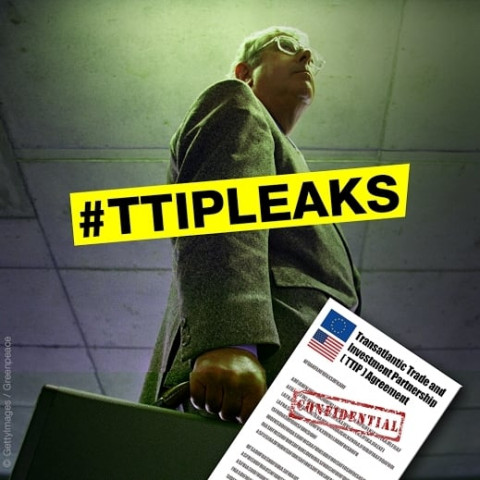TTIP: a proposed trade treaty in troubled waters
Will the ambitious TTIP, the world's largest trade pact, ever see the light of day?

PHOTO: GREENPEACE
After leaks of the closed-door negotiations surfaced Monday, a deal between the Americans and the Europeans looks less likely to be reached amid growing skepticism on both sides of the Atlantic.
Engaged in tough trade negotiations since mid-2013, the United States and the European Union tried to downplay the trove of TTIP documents put online by Greenpeace, saying they appeared to be "misleading" and deploring "wrong" interpretations of them.
US denounces 'wrong' views on TTIP leaks
But the fact remains: Despite the efforts of US President Barack Obama, who wants to clinch the trade deal by the end of the year, success seems less and less attainable.
"The most striking element of the leaks was not the substance but the fact that the two sides are still so far apart in the negotiations, that there are such big issues that remain unresolved," Edward Alden of the Council on Foreign Relations, a Washington think tank, said in an interview.
With the TTIP, the United States and the 28-nation European Union want to topple regulatory and tariff barriers to trade and investment.
There are plenty of thorny issues to tackle, from market access to opening up the EU services sector and improving European access to US government procurement projects.
Negotiators wrapped up the 13th round of talks in New York on Friday saying, as is customary, that they had made progress in the talks.
But there was a sense of irritation on the European side about the US refusal to open access to its public procurement.
"We need to reach a similar level of progress in market access procurement as we have already done in tariffs and services in order to move the negotiations towards the endgame," said Ignacio Garcia Bercero, the chief negotiator for the European Commission.
The clock, however, is ticking. An ardent defender of TTIP, Obama will leave the White House in January and his successor, to be elected in November, could be less inclined to promote free trade, an issue that has fallen out of favor with the public distraught over jobs lost overseas.
Greenpeace to release secret documents on contested EU-US trade deal
The situation is hardly less politically sensitive in Europe.
"If the deal cannot be concluded under the Obama administration, further progress in the talks likely will have to wait after the different European elections in 2017," Mark Wu, a law professor at Harvard University and a former official of the US Trade Representative, which is leading the US side in the negotiations, told AFP.
Next year, general elections will be held in two major European powers -- Germany and France -- where the debate over the TTIP is intense and could spill over into the election campaigns.
French leaders already seem to have given in to skepticism, a bad sign for a breakthrough in negotiations. During the space of a week, Prime Minister Manuel Valls and President Francois Hollande toughened their tone and pledged to oppose an accord that lacks guarantees on quality standards for health, the environment and French agriculture, among other issues.
Germany also has ratcheted up pressure, predicting the proposed deal "will fail" if the United States refuses to make concessions in the protracted talks.
And the possibility that Britain, in a June 23 vote, will decide to leave the EU is another cloud hanging over the trade talks.
"It's a period of tremendous uncertainty for trade policy in both the US and Europe," Alden noted.
The Greenpeace leaks, meanwhile, risk ossifying positions further, notably among the public.
Merkel, Obama say EU-US free trade deal would benefit both sides
"The leaks will embolden opponents of the deal and make it harder to try to bridge these differences," Wu said.
In the wake of the European nongovernmental organization's leaks, the US environmental group Sierra Club condemned the TTIP, saying it was "heading in the wrong direction and would put President Obama's trade policy on the wrong side of history."
Public Citizen, meanwhile, said the leaks show "business will gain enormous power to block, slow, undermine and repeal European regulations."
The leaks are not the first hiccup for the TTIP, which in 2014 suffered from revelations that the US National Security Agency was spying in Europe.
But they could pose a greater challenge and result in lowering the ambitions for the trade pact, even though Washington and Brussels have said they opposed any "TTIP light."
"Both sides will see a TTIP light as preferable to a complete failure of the negotiations," Alden said.



















COMMENTS
Comments are moderated and generally will be posted if they are on-topic and not abusive.
For more information, please see our Comments FAQ